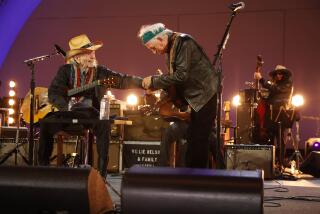Two Kinds of English Resistance : LORD NELSON The Immortal Memory<i> by David Howarth and Stephen Howarth (Viking: $24:95; 390 pp., illustrated) </i>
- Share via
1989 marks the 200th anniversary of the French Revolution. Coming at the end of a century of French intellectual leadership and followed by an attempt, temporarily successful, to make Europe a French empire, the Revolution well deserves the torrent of books that will be devoted to it this year. Two of the first of these books deal with the resistance to the Revolution: Edmund Burke, right, in the intellectual resistance, challenging the political philosophy of the Revolution; Horatio, Viscount Nelson in the military resistance, blocking the advance of Napoleon.
In London, Horatio, Viscount Nelson’s Column stands proud as any memorial to Washington or Lincoln. His ship is enshrined and Sir Francis Drake’s wasn’t. His brilliant tactics and foolish acts have become public domain through a dozen biographies, eight volumes of letters and dispatches--every form of public record, in fact, save a “Masterpiece Theatre” miniseries.
Nelson, clearly, bequeathed himself to Britain and there should be little left to say.
David and Stephen Howarth have produced a detailed, balanced chronology. It is studious, readable and clean of emotional partialities. Their fascination is Nelson and the creation of an icon, his toughness and frailties, not the win-loss stats of one admiral and the pedantics of his wars at sea.
A reader is ever aware, and thankful for that direction and the authors’ joint standing and understanding as military historians.
Yet it remains just another book about Nelson that recycles the household and schoolboy lore (at least among schoolboys in British households) of the Royal Navy’s wooden-walled glories and one officer’s spanking victories at Cape St. Vincent, the Battle of the Nile, and, in 1805, the Battle of Trafalgar.
Here’s Nelson, one-eyed, one-armed, deserting his wife for a blatant and international affair with married Lady Emma Hamilton. There’s Nelson, during one sea battle, placing a spyglass to his sightless eye and not seeing his commander’s recall flags. And Horatio Nelson, the split personality; an insecure popinjay seduced by his own decorations and fame--yet a confident, respected iron hero at sea.
And exactly as much of it was reported (less the slap and tickle and psychological interpretations) by Robert Southey in “The Life of Nelson” as early as 1813.
The longevity and intensity of this public reverence for Lord Nelson is not lost on the Howarths.
“No one and nothing can be remembered literally for ever,” they note. “Nelson is an unusually hard person to forget, or even to want to forget. The reasons for remembering him have changed often with time, fashion and individuals.
“The idea of Nelson as martyr entered into it very quickly and grew to Christ-like proportions . . . dying not only for his country but for its salvation. Even in his lifetime, he was regarded by many as a national guardian angel . . . and afterwards he became virtually a secular patron saint.
“Although some people felt Emma’s claim that during battle, he would cry out: ‘For Emma and England’ was going a bit far.”
It certainly was. On the other hand, the truths of Nelson’s life were equal to any apocrypha. By all standards of any era, he was one of the greatest heroes and military leaders the world has ever seen.
He went to sea at age 12. He was a lieutenant at 18 and a captain in command of an armed schooner at 20. Two years later he was in combat and had he lived in our time and served this country, Nelson would have been the recipient of at least the Medal of Honor, certainly the Distinguished Service Cross, and definitely four Purple Hearts.
Although slight and short, Nelson was tough enough to fight continual sea sickness, recurring malaria and an endless variety of paralyzing plagues and fevers. Emotionally, he was very much the lesser man who fell for anything in crinolines and was besotted by Lady Hamilton, the promiscuous apogee of Nelson’s vanity, arrogance and mid-life crisis.
And like George S. Patton Jr. he sensed a mystic guidance to his military service. Patton believed he was the reincarnation of a commander of Roman legions. Nelson, as a 17-year-old sailor, saw a “brilliant orb.”
He half-believed it a light from heaven and fully believed the sudden vision as “A glow of patriotism . . . (that) presented my king and country as my patron. My mind exulted in the idea. Well then, I exclaimed. I will be a hero! And confiding in Providence, I will brave every danger.”
Thirty years later, while routing Napoleon’s navy at Trafalgar, while setting an end to war at sea for more than a century, he was hit in the chest by a French musket ball and died below decks on his flagship “Victory.”
At 47, he died in the arms of his officers and surrounded by his wounded men. There was national and individual devastation sufficient to overshadow England’s final victory against the French.
A senior captain wrote to his wife: “On such terms it was a victory I never wished to have witnessed.”
A gundeck sailor wrote home in pencil and said it much better: “Our dear Admiral Nelson is killed . . . chaps that fought like the devil sit down and cry like a wench.”
Shiver my timbers, Alistair, what stuff for a “Masterpiece Theatre” miniseries.
More to Read
Sign up for our Book Club newsletter
Get the latest news, events and more from the Los Angeles Times Book Club, and help us get L.A. reading and talking.
You may occasionally receive promotional content from the Los Angeles Times.








